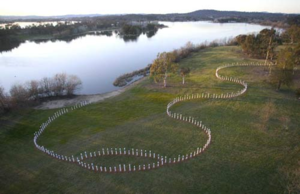SIEV-X sinking
 Temporary memorial to the SIEV X victims in Canberra, 2007. | |
| Date | 19 October 2001 |
|---|---|
| Location | Indian Ocean |
| Website | https://webarchive.nla.gov.au/awa/20140731024842/http://pandora.nla.gov.au/pan/32192/20140731-0756/www.sievx.com/index.html |
| Deaths | 400 |
| Description | While presented as an tragedy caused by greedy people smugglers, the real story is probably a carefully stage-managed psychological operation, including a deliberately foreseen sinking, arranged by Indonesian proxies of the Australian government, in order to put pressure on the Indonesian government to make people-smuggling illegal. |
SIEV X was the name assigned by Australian authorities to an Indonesian fishing boat carrying over 400 asylum seekers en route to Australia, which capsized in international waters with great loss of life on 19 October 2001. SIEV stands for Suspected Irregular Entry Vessel and is the acronym used by the surveillance authority for any boat that has entered Australian waters without prior authorisation.
While presented as an tragedy caused by greedy people smugglers, the real story is probably a carefully stage-managed psychological operation, including a deliberately foreseen sinking in a "disruption program", arranged by Indonesian proxies of the Australian government, in order to put pressure on the Indonesian government to make people-smuggling illegal.
Contents
Background
The sinking came during a period when Australia had declared people smuggling with boats as a national security threat. The head of the Australian People Smuggling Taskforce was deep state operative Jane Halton, who two decades later ran the Australian part of Covid.
Official narrative
The Australian government claimed it had no prior knowledge of the unfolding tragedy.[1][2] The government had no intelligence on the boat leaving. Despite patrolling the area being a priority, the nearest navy ship was 150 nautical miles away. Radar and several flight patrols failed to discover the boat. A flight that hovered over the area after the sinking failed to discover anything.[3]
Prime minister John Howard refused point blank at a press conference to reveal the source of his categorical assurances to the Australian people that SIEV-X sank in Indonesian waters, thus relieving Australian authorities of any responsibility for the worst maritime disaster in the region's history.[4]
Results
The Bali Process on People Smuggling, Trafficking in Persons and Related Transnational Crime was established in 2002 as a non-binding, international, multilateral forum to facilitate cooperation and collaboration, information-sharing and policy development on irregular migration in the Asia-Pacific region and beyond.[5]
Immigration Minister Philip Ruddock stated that the sinking of the boat and the deaths of its 353 passengers "may have an upside ... In the sense that some people may see the dangers inherent in it."[6]
In 2011, Indonesia passed a law against people-smuggling, with a possibility of 15 years jail or large fines[7].
Problems with official narrative
SIEV X was a coffin ship, so unseaworthy and overloaded that it could never have reached Australian territory. It was intended to sink.[8]
Former diplomat Tony Kevin pointed out several flaws in the official narrative[9]:
- It is likely that the alleged people smuggler Abu Quassey was a police disruption or 'sting' agent. This is suggested by the sustained high-level of Indonesian and Australian protection before, during and after the sinking of SIEV X, as well as by subsequent Australian Federal Police (AFP) attempts to help minimise his sentence in his 2003 trial in Egypt and render him immune from further prosecution.[9]
- The AFP have a history of involvement, under the people-smuggling disruption program, with a self-confessed Australian people smuggler and sinker of boats, Kevin Eniss.[9] Australian Federal Police (AFP) agents paid local Indonesians to sabotage refugee boats departing for Australia.
- As Commissioner Keelty reluctantly admitted, the conduct of Indonesian police people-smuggling disruption teams - initially set up, trained, equipped and funded by the AFP - was out of AFP control, and criminality in Indonesian disruption operations (for example the deliberate sinking of boats) could not be ruled out.[9]
- There was a pattern of disruption operations in Indonesia before SIEV X, involving frequent sinkings and voyage failures in Indonesian waters, and of the progressive elimination of autonomous people smugglers from the Indonesian market in order to clear the way for 'sting' operators in contact with the disruption program.[9]
- The striking precise official and media reporting after the sinking of SIEV X, covering, for example, the boat's size, structure, fuel capacity, and passenger details, could not have come from survivors: it must have been provided by sources close to the organisers of the SIEV X voyage.[9]
- Tracking devices may have been fitted on board; if so, by whom?[9]
- Reports of radio distress messages sent by SIEV X remain unexplained.[9]
- Survivors reported the appearance of military-type vessels which failed to rescue survivors. Where did they come from?[9]
- The arrival of a well organised rescue operation the next day and the return of the survivors by boat to Jakarta, along with the close management of news and information, is suspicious.[9]
- What is the provenance and significance of a photograph of SIEV X, taken before it got into trouble, and allegedly shown to two survivors by Australian police officials?[9]
A survivor recounted that while he was in the water for over 20 hours he heard a plane circle overhead.[10]
In September 2002 Senator John Faulkner delivered a speech to the Senate on the People Smuggling Disruption Program in Indonesia. In the concluding section of this speech, Faulkner asks if there is a link between the disruption program and the sinking of SIEVX and goes on to raise the possibility that the disruption program in Indonesia may have been used as a 'licence to kill'.[11]
Senate Select Committee
On 20 February 2002, the Australian Senate Select Committee inquiring into 'A Certain Maritime Incident' met for the first time. Its primary task was to investigate the children overboard affair, however its terms of reference also included investigating "operational procedures observed by the Royal Australian Navy and by relevant Commonwealth agencies to ensure the safety of asylum seekers on vessels entering or attempting to enter Australian waters".
The committee investigated the SIEV-X sinking, and concluded that "... it [is] extraordinary that a major human disaster could occur in the vicinity of a theatre of intensive Australian operations and remain undetected until three days after the event, without any concern being raised within intelligence and decision making circles." While no government department was found to be to blame for the tragedy, the committee was surprised that there had been no internal investigations into any systemic problems which could have allowed the Australian government to prevent it from occurring."
Related Quotation
| Page | Quote | Author |
|---|---|---|
| Jane Halton | “Leave your personal baggage [moral scruples] at the door.” | Jane Halton |
References
- ↑ https://www.safecom.org.au/tkevin-book1.htm
- ↑ https://www.aph.gov.au/Parliamentary_Business/Committees/Senate/Former_Committees/maritimeincident/report/c08
- ↑ https://www.aph.gov.au/Parliamentary_Business/Committees/Senate/Former_Committees/maritimeincident/report/c08
- ↑ https://www.smh.com.au/opinion/sievx-another-howard-lie-another-official-cover-up-20030522-gdgt2e.html
- ↑ https://www.baliprocess.net/about-the-bali-process/
- ↑ https://www.wsws.org/en/articles/2021/10/19/siev-o19.html
- ↑ https://www.bbc.com/news/world-asia-pacific-12997326
- ↑ https://tasmaniantimes.com/2011/10/its-time-for-the-truth-to-allay-or-confirm-our-fears-about-siev-x/
- ↑ a b c d e f g h i j k Tony Kevin A Certain Maritime Incident, page 11
- ↑ https://www.wsws.org/en/articles/2004/05/siev-m26.html
- ↑ https://web.archive.org.au/awa/20140731024842mp_/http://pandora.nla.gov.au/pan/32192/20140731-0756/www.sievx.com/testimony/20020926Faulkner3SpeechesToSenate.html
